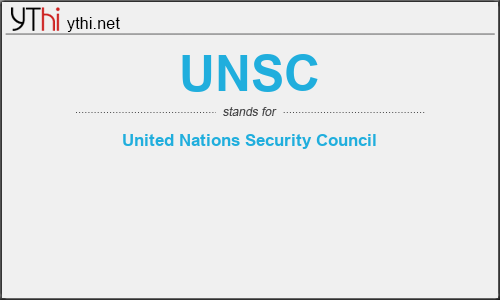What does UNSC mean? What is the full form of UNSC?
The full form of UNSC is United Nations Security Council.
In October 2000, the UN Security Council unanimously adopted resolution 1325- a turning point in understanding and recognizing the role of women and girls in addressing the issues of peace and security. Security Council Resolution (SCR) 1325 is the most comprehensive work to date on linking the issues of gender equality with peace and security and has been further substantiated through six additional Security Council resolutions, including SCRs 1820 (2008), 1888 (2009), 1889 (2009), 1960 (2010), 2106 (2013), and 2122 (2013). The purpose of this course is to raise awareness about the importance of these UN SCRs; to build capacities for their implementation; and to promote their sustainable implementation at the regional and national levels. While informative for any student interested in the topic, the course was especially designed for people who work in the area of peace and security at the national or regional levels in Africa, and who require a practical tool to support and facilitate the implementation of the women, peace, and security agenda. The first three lessons focus more broadly on the UN’s role in promoting a peace and security agenda, including from a gender perspective, and the role of SCR 1325 (2000) and subsequent resolutions. Within this context, Lessons Four and Five highlight the challenges and priorities specific to the African region. Finally, Lesson 6 examines the role of both regional and subregional organizations in supporting national implementation of the resolution. This course was developed by the United Nations Entity for Gender Equality and the Empowerment of Women (UN Women) in collaboration with the Peace Operations Training Institute. Six lessons.
Selected excerpts from Prendergast’s remarks:
- “Throughout history, war may have been hell, but for small groups of conflict profiteers it has also been very lucrative. Today’s deadliest conflicts in Africa — such as those in South Sudan, Somalia, northern Nigeria, Sudan, the Central African Republic, and the Democratic Republic of Congo — are sustained by extraordinary opportunities for illicit self-enrichment that emerge in war economies, where there is a visible nexus between grand corruption and mass atrocities.”
- “As it stands now, war crimes pay. In order for peace to have any chance, those benefiting from the human misery wrought by conflicts around the world need to pay a price, whether financial, legal, or political, and the corrupt systems that underlie them need to be ended.”
- “Until the Security Council and other interested parties with potential influence can create leverage to change these dynamics, the bottom line is that war is more beneficial than peace for those at the center of conflict and corruption.”
- “Remarkably, and regrettably, there is currently no coordinated strategy to gain this necessary leverage to disrupt the illicit siphoning of money by leaders and their foreign business partners, to break the link between corruption and conflict. Every year, billions of aid dollars pour into Africa. UN agencies, taxpayers, and donors around the world fund peacekeeping forces, state-building programs, humanitarian assistance, elections, and peace processes. But none of this support has been able to keep corrupt leaders and their network of beneficiaries from stealing billions of dollars because the diplomats leading these efforts have no leverage to change the systems that perpetuate conflict… This is not about regime change. It is about system change.”
- “The policy tools that can provide the UN Security Council and other interested parties with maximal leverage are three-fold: a network-focused approach to sanctions that focus on grand corruption; anti-money laundering measures that focus on illicit movement of money through the international financial system; and prosecutions that focus on financial crimes associated with atrocities.”
- “Ultimately, these tools of financial pressure are not an end in themselves, but should be deployed in the context of a comprehensive strategy that intensifies diplomacy and supports institutions of accountability and transparency.”
- “In order for peace to have any chance, those benefiting from the human misery wrought by conflicts around the world need to pay a price, whether financial, legal, or political, and the corrupt systems that underlie them need to be ended.”
UNSC
means
United Nations Security Council![]()
Translate United Nations Security Council to other language.


Leave a Reply
You must be logged in to post a comment.